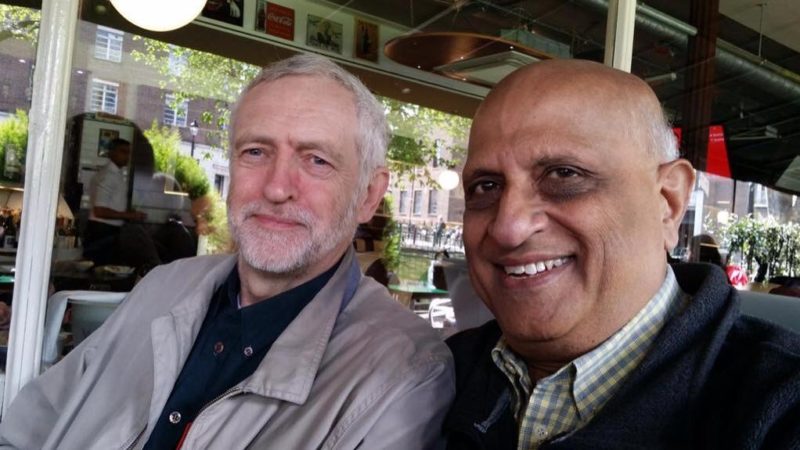
This evening will see a celebration of the life of Narendra Makanji, the socialist anti-racism campaigner and veteran Labour councillor, who tragically passed away, aged 66. Jeremy Corbyn was among those paying tribute. I first got to know Narendra when he was a leading light in the anti-racism movement in the early 90’s. Before that, he was part of the Labour Black Sections push for BME political representation, and he also campaigned against Apartheid.
Narendra was a movement-builder whose personal qualities made him uniquely equipped to inspire others. As Seema Chandwani’s excellent tribute discussed, he was as adept at strategic political analysis as he was fearless in calling out racism. Narendra’s contribution, and his politics, should not be forgotten. Many on the left call ourselves anti-racists, but that means different things to different people.
What is anti-racism? For non-minorities, it is checking their privilege, learning about how racism manifests, and calling it out; for organisations, it is rigorous self-assessment and positive action to create equality and an environment free of discrimination and judgement. But for government the challenge is far bigger: it is tackling institutional discrimination with surgery on ‘the system’. Systemic change will doubtless be met by institutional resistance, including from Whitehall. Picking battles will leave many discriminating systems untouched.
Unless the anchor of anti-racism is firmly fixed, the ship of racial justice will be blown away by the currents of other priorities, including from within the equalities field such as class and gender – areas that overlap with race but are also distinct in the way types of discrimination manifests. Intersectionality means not just that people can face multiple forms of discrimination based on different aspects of themselves, but also that people who are, for instance, BME, women, LGBT+ or disabled can discriminate against each other.
Anti-racism is a doing verb. It’s like going to the gym instead of just carrying a gym membership card. Having a party of anti-racists led by stalwart anti-racists like Corbyn and John McDonnell is a massive advantage, but still no guarantee of success. If decades of research and action plans has taught us anything, it is the extent of entrenched and systemic racial disadvantage.
Labour is not automatically anti-racist simply because we believe that we are. When we get into government, it will be about more than audits and targets. A serious assessment of the extent of racial disadvantage, and a real plan to eradicate it, should be a central mission of a transforming socialist government. Just as the party is building detailed and far-reaching policies to reform labour law and shift the balance back to workers, so too Labour must put into practice our anti-racist instincts with a radical programme that aims to eliminate racial bias.
We have a good platform to build on. Labour’s BAME manifestos in 2015 and 2017 pledged to tackle racism across the public sector. Labour’s record on race is also superior to any other party. Yet our last achievement – the Race Relations (Amendment) Act – was almost two decades ago and some of that was rolled back under Gordon Brown. Thinking on race, and evidence widespread unequal racial outcomes in employment, education, and every other area of life, has moved on. BME communities are investing huge levels of faith in Corbyn’s Labour to deliver on equality and justice. We need a new set of laurels to wear.
My preference is a four-pronged approach. First, a new equalities framework, with a government department and minister, separate commissions for each ‘protected characteristic’, and an updated law that covers the private sector and media, and includes socio-economic discrimination, intersectionality and the UN definition of racism.
Second, new ways to change hearts and minds such as public education campaigns. Super-charging and resourcing the existing ‘positive duty’ to promote equality will ensure organisations and services are genuinely anti-racist in reality, not just ticking boxes.
Third, building ‘reparations’ into the tax system to compensate for historic disadvantage suffered by people of colour, compounded by factors like rising house price causing wealthy white people to keep hold of their disproportionate ownership of high value property despite changing demographics. Some income from a progressive land tax could be invested in compulsory purchase of valuable homes when the tenants die, so that the property becomes part-owned by individuals and the state, and so that new home ownership is not restricted to small new-build flats but also includes old houses in desirable areas. And investment in quality social housing that is fit for the heroes and heroines of our public services, not just box units.
And fourth, new opportunities to tackle racism are being opened with new technologies and big data. We are now able to gather and analyse vast amounts of cradle-to-the-grave information on ethnicity to compare incomes and jobs with education levels. We can drill down into companies and sectors to find detailed patterns of discrimination. This allows individuals and government to use our spending power to tackle racial disparities.
There will be other ideas, but we need a renewed debate about anti-racism and how we deliver on our beliefs in government.
Celebrating the Life of Narendra Makanji – 7pm, Tuesday 16th April, at the Bernie Grant Arts Centre, Town Hall Approach Road, Tottenham, N15 4RX. All welcome.




More from LabourList
‘Tackling poverty should be the legacy of Keir Starmer’s government’
‘The High Court judgment brings more uncertainty for the trans community’
‘There are good and bad businesses. Labour needs to be able to explain the difference’